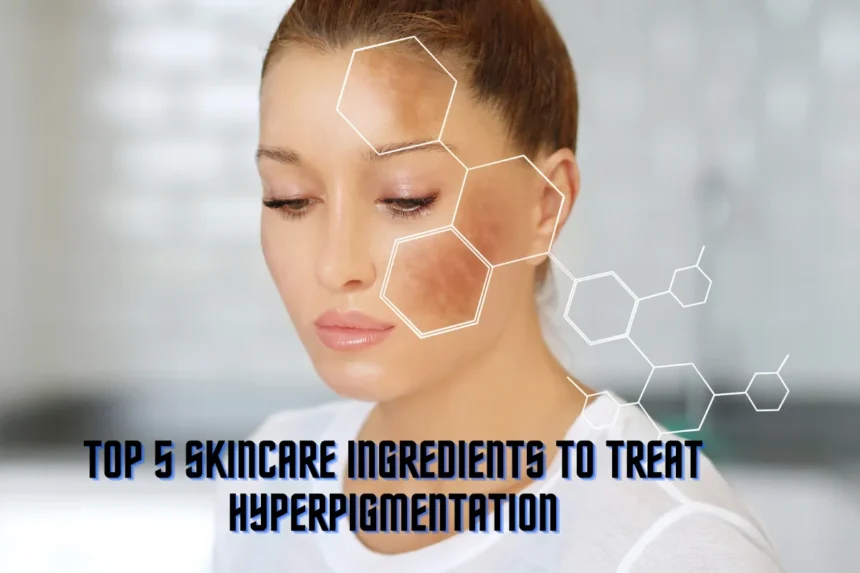Hyperpigmentation, characterized by patches of darkened skin, is a common dermatological concern affecting people of all ages and skin types.
Whether caused by sun exposure, hormonal changes, or skin injuries, addressing hyperpigmentation requires targeted skincare solutions.
Fortunately, the skincare industry offers a plethora of potent ingredients known for their ability to fade dark spots and even out skin tone.
In this comprehensive guide, we explore the top five skincare ingredients renowned for treating hyperpigmentation, their mechanisms of action, and how to incorporate them into your skincare routine for radiant, uniform complexion.
Hydroquinone:
Hydroquinone stands as one of the most effective and widely used ingredients for treating hyperpigmentation.
This skin-lightening agent works by inhibiting the production of melanin, the pigment responsible for skin color.
By blocking the enzyme tyrosinase, which catalyzes melanin synthesis, hydroquinone reduces the formation of dark spots and promotes a more even skin tone.
Typically available in concentrations ranging from 2% to 4%, hydroquinone can be found in various skincare products, including creams, serums, and spot treatments.
However, it’s essential to use hydroquinone under the guidance of a dermatologist due to potential side effects such as skin irritation and rebound hyperpigmentation with prolonged use.
Vitamin C (Ascorbic Acid):

Renowned for its antioxidant properties, vitamin C, or ascorbic acid, is a powerhouse ingredient in skincare formulations targeting hyperpigmentation.
As a potent tyrosinase inhibitor, vitamin C helps to regulate melanin production, thereby fading dark spots and brightening the complexion.
Additionally, vitamin C neutralizes free radicals generated by UV exposure, which can exacerbate hyperpigmentation and accelerate skin aging.
Incorporating a vitamin C serum into your daily skincare routine can help reduce existing hyperpigmentation while protecting against future damage.
Look for stabilized forms of vitamin C, such as L-ascorbic acid or ascorbyl tetraisopalmitate, for optimal efficacy and stability.
Alpha Hydroxy Acids (AHAs):
Alpha hydroxy acids, including glycolic acid, lactic acid, and mandelic acid, are exfoliating agents that promote skin cell turnover and renewal.
By gently exfoliating the skin’s surface layer, AHAs help to slough off dead skin cells containing excess melanin, revealing fresher, more evenly toned skin underneath.
Additionally, AHAs can enhance the penetration of other skincare ingredients, such as hydroquinone and vitamin C, thereby maximizing their efficacy in treating hyperpigmentation.
When incorporating AHAs into your skincare routine, start with lower concentrations and gradually increase frequency to avoid irritation, particularly for those with sensitive skin.
Retinoids (Retinol, Tretinoin):
Retinoids, derivatives of vitamin A, are revered for their myriad benefits in skincare, including their ability to address hyperpigmentation.
By promoting cellular turnover and collagen synthesis, retinoids accelerate the shedding of pigmented skin cells while stimulating the production of new, evenly pigmented cells.
Furthermore, retinoids possess anti-inflammatory properties that can help reduce the appearance of hyperpigmentation associated with conditions such as acne and post-inflammatory hyperpigmentation.
However, retinoids can cause irritation, dryness, and increased sun sensitivity, so it’s crucial to start with a low concentration and gradually increase frequency as tolerated.
Additionally, retinoids should be used in conjunction with sunscreen to mitigate potential adverse effects and maximize results.
Niacinamide (Vitamin B3):

Niacinamide, also known as vitamin B3, offers a multifaceted approach to treating hyperpigmentation, making it a versatile ingredient for all skin types.
As a potent inhibitor of melanosome transfer from melanocytes to keratinocytes, niacinamide reduces the transfer of melanin to the skin’s surface, thereby minimizing the appearance of dark spots and uneven pigmentation.
Additionally, niacinamide boasts anti-inflammatory properties that help soothe irritated skin and reduce redness associated with hyperpigmentation.
Furthermore, niacinamide enhances the skin’s barrier function, improving moisture retention and overall skin health.
Incorporating a niacinamide serum or moisturizer into your skincare routine can help fade existing hyperpigmentation while preventing future discoloration.
Conclusion:
Achieving a clear, radiant complexion free from hyperpigmentation requires a strategic skincare approach centered around potent ingredients known for their skin-lightening and brightening properties.
By incorporating hydroquinone, vitamin C, alpha hydroxy acids, retinoids, and niacinamide into your daily skincare routine, you can effectively target dark spots, even out skin tone, and reveal a luminous complexion.
However, it’s essential to approach hyperpigmentation treatment with caution, especially when using potent ingredients like hydroquinone and retinoids, as they can cause adverse effects if used improperly.
Consulting with a dermatologist can help tailor a skincare regimen suited to your specific skin concerns and needs, ensuring safe and effective results in the journey towards flawless skin.

